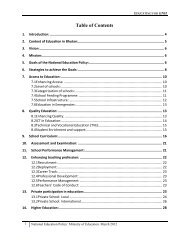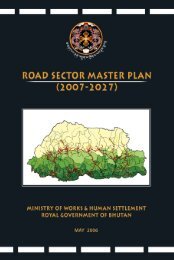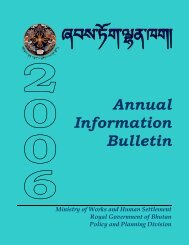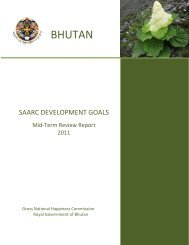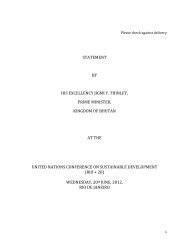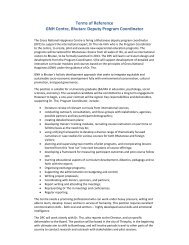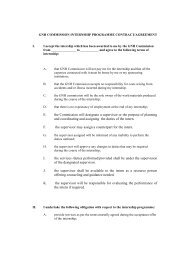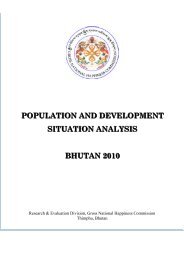COUNTRY BACKGROUND - Gross National Happiness Commission
COUNTRY BACKGROUND - Gross National Happiness Commission
COUNTRY BACKGROUND - Gross National Happiness Commission
You also want an ePaper? Increase the reach of your titles
YUMPU automatically turns print PDFs into web optimized ePapers that Google loves.
Health Services<br />
Table 13.4 Morbidity Patterns for Major Diseases as Percentage of BHU Cases (1985-19889)<br />
13.13 Lack of hygiene and poor sanitation causes many infectious diseases. Diarrhoea and respiratory tract<br />
infections remain by far the most frequent diseases treated by the health services. Worm infestations are estimated<br />
to occur in up to 80% of the population. The majority of the diseases treated are seasonal and there is a marked<br />
fluctuation in the out-patient department attendance between summer and winter. Nutritional deficiencies are an<br />
important part of the disease pattern in Eastern Bhutan. A large proportion of the population suffer from gastric<br />
problems such as gastritis, peptic ulcer and ventricular cancer due to dietary habits and consumption of doma (a<br />
mixture of wet betel nut, paan (leaf) and calcium paste). Sexually transmitted diseases are also common among<br />
some sections of the population.<br />
Nutrition StatusNutrition Status<br />
13.14 A nationwide nutrition survey was carried out between December 1986 and March 1988. It generated<br />
information on the nutritional status of children up to 3 years and women between the age range of 15-45 years. It<br />
was found that 56.1% of the children were small for their age and 37.9% of children were found to be underweight<br />
for their age according to the WHO classification.<br />
13.15 In the same survey, 13.8% of women examined were found to have Body Mass Index below 18.4 indicating<br />
a serious calorie deficiency. Vitamin A and iodine deficiency and anaemia were also found to be unacceptably<br />
high.<br />
C. ConstraintsC. Constraints<br />
Poor Sanitation and HygienePoor Sanitation and Hygiene<br />
13.16 The existing morbidity pattern shows a high prevalence of respiratory infections, diarrhoea and worm<br />
infestations. The incidence of these diseases can be minimised and prevented to a large degree by improving the<br />
water supply system and promoting sanitation and hygiene. A change in personal hygiene would make a<br />
considerable impact on the health of the population.<br />
Remote and Scattered PopulationRemote and Scattered Population<br />
13.17 Because the population is scattered, with an undeveloped road network, the District and Regional level<br />
health facilities are fairly unaccessible to the majority of the people. These factors also make the cost of health<br />
delivery very high. In most remote areas, the modern health services are sought as a last resort, resulting in<br />
diagnostic and therapeutic delays. A delay and in some cases failure to demand health services leads to insufficient<br />
utilization of existing health services. The effectiveness of modern health services is thus reduced.<br />
13.18 The low literacy level, especially among women is thought to be a leading obstacle to the improvement of<br />
the health status of most people. Giving high priority to the education of women is recognised as an investment in<br />
health.<br />
Shortage of Trained PersonnelShortage of Trained Personnel<br />
13.19 As in most other sectors, the health sector is constrained by a lack of trained national staff. The Department<br />
is dependent on expatriate personnel. Of the total DHS staff of 1019, 283 were expatriates in 1991.<br />
II. Review of Past PerformanceII. Review of Past Performance<br />
4<br />
Disease 1985 1986 1987 1988 1989<br />
Diarrhoeal disease 18.3 17.5 15.6 15.0 15.2<br />
Respiratory disease 16.6 16.5 16.7 18.2 19.5<br />
Worm infestation 11.6 11.7 11.0 12.9 10.0




